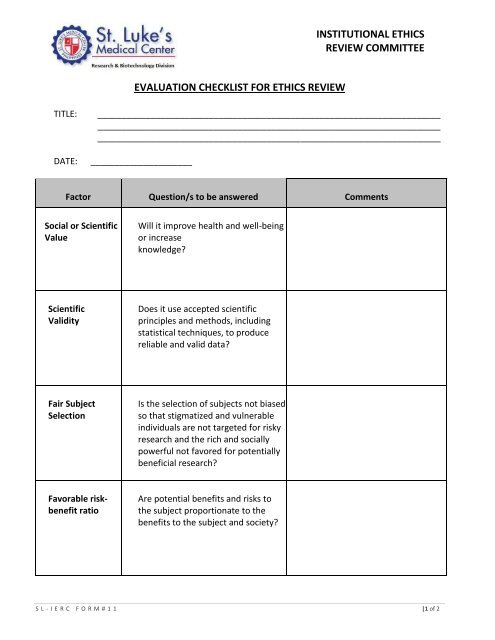Imagine this: you’re a seasoned radiologic technologist, diligently performing your duties. Suddenly, a colleague confides in you, revealing a potential ethical violation that could even carry criminal consequences. What do you do? This scenario might seem far-fetched, but the reality is that ethical dilemmas in the medical field, particularly those involving criminal violations, are more common than you might think.

Image: www.yumpu.com
This guide delves into the ARRT Ethics Review Checklist, a crucial resource for radiologic technologists when encountering situations that potentially breach ethical boundaries and may even carry legal repercussions. Understanding this checklist empowers you to navigate ethical complexities, ensure patient safety, and uphold the integrity of the radiologic profession.
Understanding the ARRT and its Ethical Guidelines
The American Registry of Radiologic Technologists (ARRT) is a leading credentialing organization for medical imaging and radiation therapy professionals. The ARRT’s fundamental purpose is to ensure the public receives safe and competent radiological care. This mission hinges on upholding a stringent Code of Ethics, which serves as a guiding framework for all ARRT-registered technologists.
The ARRT Code of Ethics is a non-negotiable set of principles that form the foundation of ethical practice in the radiologic field. It lays out the core values that should underpin every interaction with patients and colleagues.
The Importance of the ARRT Ethics Review Checklist
The ARRT Ethics Review Checklist is a practical tool designed to assist registered technologists in identifying potential ethical violations. It’s an invaluable guide that helps navigate complex scenarios, particularly those involving criminal activities like fraud, theft, or patient abuse.
The checklist is a resource meant to be used proactively. Instead of waiting for a situation to escalate, radiologic technologists can use the checklist to preemptively identify potential ethical conflicts and take appropriate action.
Navigating the Checklist: Key Components
The ARRT Ethics Review Checklist is broken down into several key sections, each focusing on a specific type of ethical dilemma:
1. Patient Rights and Confidentiality:
- Respecting patient privacy: Ensuring confidential medical information is handled appropriately and securely.
- Informed consent: Obtaining voluntary permission from patients before procedures, ensuring they understand the risks and benefits.
- Patient autonomy: Enabling patients to make their own decisions regarding their care, within ethical and legal parameters.
2. Professional Conduct & Boundaries:
- Maintaining professional boundaries: Avoiding personal relationships with patients, maintaining an appropriate professional demeanor at all times.
- Reporting unethical conduct: Filing complaints against colleagues who engage in questionable practices promptly, adhering to proper reporting procedures.
- Integrity and honesty: Upholding honesty in all interactions within the workplace, maintaining accurate documentation and records.
3. Legal and Regulatory Compliance:
- Adherence to ARRT regulations: Following established regulations and standards set by the ARRT and other relevant governing bodies.
- Understanding legal ramifications: Recognizing potential legal consequences of ethical violations, ensuring actions comply with both ethical and legal frameworks.
- Reporting illegal activities: Reporting any suspected criminal activities to the appropriate authorities, including law enforcement or regulatory bodies.
4. Criminal Violations:
- Fraud and theft: Identifying potential situations involving financial impropriety or stealing of property.
- Patient abuse: Recognizing signs of physical, psychological, or sexual abuse, reporting suspected cases immediately.
- Data security breaches: Upholding data privacy by ensuring sensitive patient information remains protected from unauthorized access.

Image: www.studocu.com
Real-World Examples: Applying the ARRT Ethics Review Checklist
Let’s bring these concepts to life with a few practical examples:
Scenario 1: A colleague mentions they routinely overbill patients for certain procedures.
- Checklist application: This situation involves fraud, falling under the criminal violations category.
- Ethical action: You have an ethical obligation to report this behavior to the appropriate authorities, potentially including your supervisor or internal affairs.
Scenario 2: You witness a fellow technologist verbally abusing a patient during a procedure.
- Checklist application: This situation falls under patient abuse, categorized under criminal violations.
- Ethical action: In this case, immediate action is required. You should report this incident to your supervisor, and possibly to law enforcement if the abuse seems severe.
Scenario 3: A patient insists on receiving a medical imaging exam despite not having a doctor’s order.
- Checklist application: This scenario involves informed consent and patient autonomy.
- Ethical action: While respecting patient autonomy is important, you must also prioritize patient safety. Explain the importance of a doctor’s order, and document the situation in your medical records.
Expert Insights and Tips for Navigating Ethical Dilemmas
Dr. Emily Carter, a renowned ethics specialist in the medical field, emphasizes the critical role of self-reflection and emotional intelligence in navigating ethical dilemmas:
- “The ARRT Ethics Review Checklist is a fantastic tool, but it only serves as a starting point. Developing your own moral compass and empathy for others is essential for navigating complex situations.”
Dr. Carter also underscores the importance of professional support:
- “Don’t hesitate to reach out to mentors, supervisors, or professional organizations for guidance when faced with ethical challenges. You’re not alone.”
Arrt Ethics Review Checklist For Criminal Violations
Conclusion
The ARRT Ethics Review Checklist is a vital resource for every radiologic technologist. Recognizing ethical challenges, particularly those with legal implications, and taking appropriate action is not just a professional responsibility but a moral imperative. By actively utilizing this checklist, you can safeguard your career, uphold the integrity of the radiologic profession, and contribute to the delivery of safe and ethical care for all patients.
If you are ever faced with an ethical dilemma that you can’t resolve, remember that seeking support and guidance from experts or reputable professional organizations like the ARRT is vital.






